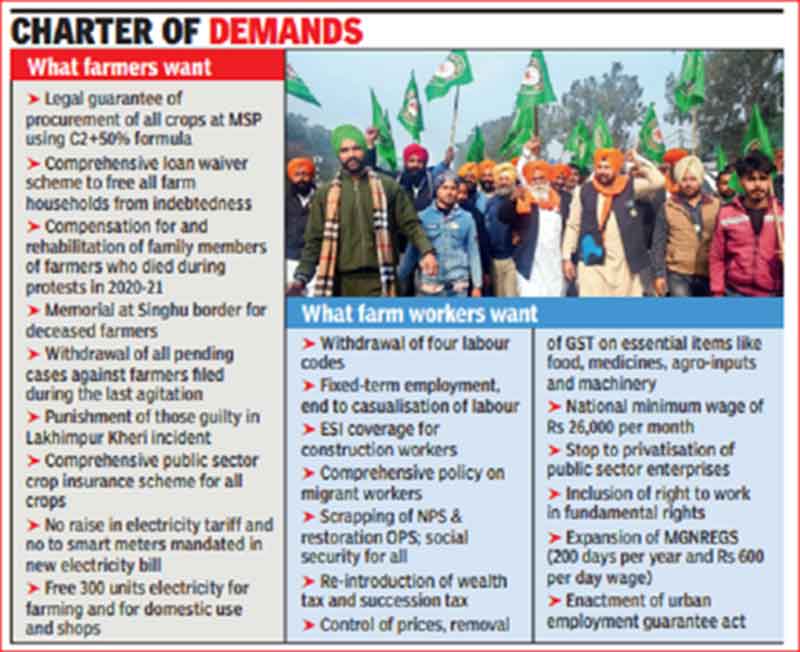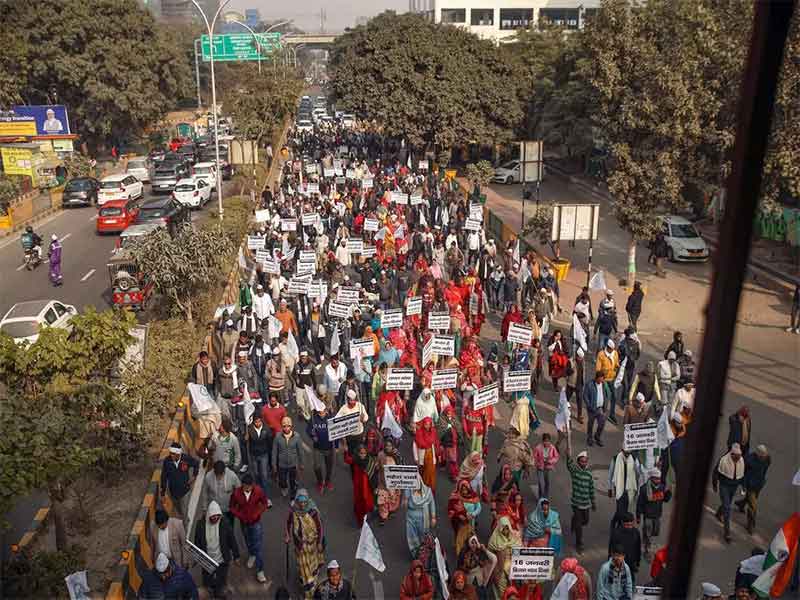
It is not every day that one needs a doctor, a lawyer, a policemen or a priest, but everyday, three times a day, you need a farmer.
Farmers are not a homogenous community. There are caste and class differences because, among land-owning farmers, the socio-economic spectrum of farmers is huge. At one end are wealthy, university-educated farmers with large land-holdings, who are also traders or aggregators, own agri-based industries, have political clout (sometimes as MLAs/MPs), and may or may not live on their land. At the low end, are marginal/ subsistence farmers who live on their land.
India’s rural communities are over 60% of our 1.3-billion population. They are a mix of land-owning farmers, share-croppers, landless labourers, artisans, and workers in agri-based industries.
Farmers owning less than 2-hectares land are designated “small farmers” [SFs, hereinafter], who are 86% of all farmers. [Amit Raja Naik; “Despite Agri Financing Tech Growth, Over Half Of India’s Small Farmers Struggle For Credit“; <https://inc42.com/buzz/50-of-small-and-marginal-farmers-in-india-are-financially-underserved/>; June 1, 2020]. However, a farmer holding even 3-hectares would be in similar financial/ economic/ educational circumstances. Thus, the proportion of farmers who are SFs would certainly be closer to 90%.
Many SFs or members of their family are also part-time or off-season migrant labourers for financial/ economic reasons. Traders in rural areas supply agri inputs to SFs and are also pawn brokers, money-lenders and farm-gate buyers of SF’s produce.
Who are protesting the new Farm Laws?
The protesting farmers are mostly SFs, including women. Among the protestors are also other farmers who may not be SFs, but understand that the new Farm Laws will affect them adversely. Also among the protestors are landless labourers and workers, who are dependent upon farmers.
Another group are Armed Forces Veterans, who retired at ages 38 to 42 and returned to their farmer-worker roots in the rural community. They are not insignificant numbers especially in Punjab, Haryana, Rajasthan and UP. They bring Lal Bahadur Shastri’s slogan “Jai Jawan! Jai Kisan!” to life.
The new Farm Laws
The new Farm Laws [Farm Laws, hereinafter] effective 27.9.2020, which are being opposed are:
# The Farmers’ Produce Trade and Commerce (Promotion and Facilitation) Act, 2020 [FPTC Act hereinafter],
# The Farmers (Empowerment and Protection) Agreement on Price Assurance and Farm Services Act, 2020 [FAPAFS Act hereinafter], and
# The Essential Commodities (Amendment) Act, 2020 [ECA Act hereinafter], which amended the Essential Commodities Act 1955 [EC Act 1955, hereinafter].
Purposes of the Farm Laws
# The FPTC Act provides for “the creation of an ecosystem where the farmers and traders enjoy the freedom of choice relating to sale and purchase of farmers’ produce which facilitates remunerative prices through competitive alternative trading channels; to promote efficient, transparent and barrier-free inter-State and intra-State trade and commerce of farmers’ produce outside the physical premises of markets or deemed markets notified under various State agricultural produce market legislations; to provide a facilitative framework for electronic trading”.
# The FAPAFS Act provides for “a national framework on farming agreements that protects and empowers farmers to engage with agri-business firms, processors, wholesalers, exporters or large retailers for farm services and sale of future farming produce at a mutually agreed remunerative price framework in a fair and transparent manner”, and
# The ECA Act simply introduces a new clause 3(1A) to amend the EC Act 1955, the purpose of which was “to provide, in the interest of the general public, for the control of the production, supply and distribution of, and trade and commerce, in certain commodities”.
Macro issues
There are many issues surrounding the Farm Laws. Views on some of the macro issues are:
# There is nothing in the purposes of the Farm Laws, which suggest urgent need to pass them as Ordinances. Rather than paying attention to alleviate the monumental nationwide humanitarian-social-economic crises precipitated by a 4-hours-notice physical-distancing lockdown to handle the Covid Pandemic, Government’s decision and motives to pass the Ordinances during the Pandemic are being questioned.
# The unseemly haste and process (voice vote) with which two of these Bills were passed through Rajya Sabha have brought the central executive and legislature no glory.
# A writ petition was filed in Supreme Court on 05.10.2020, challenging the Rajya Sabha’s legislative process and challenging the Farm Laws as violative of provisions of Schedule VII of the Constitution, by which agriculture is a State subject. Unfortunately, Supreme Court has not seen fit to schedule or hear this petition, inspite of the serious on-going public protests against these very Farm Laws. That a certain petition concerning an individual was given priority over this and other petitions waiting for many months, and was adjudicated extremely rapidly by the Supreme Court, has done nothing to enhance the reputation of the apex judiciary.
The small farmer
The arguments concerning the Farm Laws are focussed on their effects on small farmers (SFs).
Farming, a vital part of the food system, is a socio-cultural-economic activity. It is greatly different from Tamil Nadu to Punjab and from Manipur to Gujarat. Accordingly, the producer-intermediary-consumer system which ensures farm-to-market-to-plate movement of food, varies from state to state. The intermediaries are traders, commission agents and stockists, and the marketing, trading and commerce system varies from state to state.
Typically, a SF is economically, financially and educationally disadvantaged, although in different ways and to different extents, between and even within different states. His assets are land, household and personal belongings, farming experience-expertise, and his capacity for labour, without forgetting that women provide 75% of the actual hands-on labour in sowing, weeding, harvesting, etc.
He lives from crop-to-crop or season-to-season. Having no financial or time cushion, and thus no bargaining power, he depends upon obtaining credit at the start of a season, and after harvest, marketing his produce as soon as possible, to pay off loans taken for farming or for personal reasons like medical expenses.
The FPTC Act
The FPTC Act is focused on facilitating trade and commerce.
Comment: SFs cannot use the “freedom” to sell anywhere to anyone, because of their financial/ economic/ resources circumstances and lack of bargaining power. This Law is designed to favour traders, stockists and wealthy farmers and help corporations.
A farmer has a dispute with a trader. He takes recourse to a Dispute Resolution Mechanism under Section 8 (1) of FPTC Act. The aggrieved farmer files an application to the SDM (located in a distant town or city) who refers it to a Conciliation Board.
Comment:
The financial means for travel-stay in a town, time, access, etc., to file and follow-up is out of reach for a farmer, besides the outcome being uncertain. But if the trader is aggrieved, he has all the advantages of financial-economic superiority. With no real bargaining power, the farmer does not enter into dispute with trader, but requests (begs) for better price and accepts the trader’s terms. The agency for dispute resolution which the FPTC Act provides a SF, is only notional.
A farmer suffers loss due to unfair trade practice by an electronic trading platform. Under Section 9(1) of FPTC Act, he petitions the designated government official, who examines the dispute. If his claim is judged as correct, he gets paid after 60-days.
Comment:
The means, travel, time, access, etc., to petition and follow-up is out of reach for a farmer, and the outcome is uncertain. Besides he must wait for 60-days to recover the loss.
A farmer is not satisfied with the decision of the government official under Section 8 (1) or 9(1) of FPTC Act. He has recourse to legal proceedings.
Comment:
Litigation is very expensive and time-consuming. But most importantly, under Section 13 of FPTC Act, an erring official cannot be prosecuted if his decision was “taken in good faith”. It is impossible for a farmer to prove corruption by an official. Viewing this “good faith” protection to an official as easing/ enabling corruption, is not cynicism but realism. In any case, the farmer is at a disadvantage, with no legal remedy.
FPTC Act Section 3 reads “any farmer or trader or electronic trading and transaction platform shall have the freedom to carry on inter-State or intra-State trade and commerce in farmers’ produce in a trade area”, but Section 2(f) excepts trade areas which come under a State APMC Act. Further, Section 14 of FPTC Act bluntly overrides the State APMC Act.
Comment: FPTC Act is a Central Act, which overrides State Acts on a subject which is on the State List of Schedule VII. This is constitutionally questionable, besides clearly being meant to dismantle the earlier system. (This is not to argue that the earlier system was beneficial to the farmer – this matter is discussed in later paragraphs).
The FAPAFS Act
The FAPAFS Act concerns written agreements between individual farmers and “Sponsors” (agri-business firms/ processors/ wholesalers/ exporters/ large retailers).
An agreement between farmer and Sponsor is executed at the start of a season, when the farmer needs credit and other support. It specifies [Section 3] that the Sponsor supplies seed, fertiliser, etc., to the farmer to produce X-quintals of a particular crop of specified quality on a specified future date, and includes the price which the Sponsor pays the farmer “on its delivery as per the agreed terms“ [Section 2(g)]. Default on the terms of the written agreement by either party involves penalty.
The penalty would inevitably be monetary and would always be disputed. The chances of a Sponsor defaulting are near-zero, and even if he does and refuses to pay the farmer, the recourse that a farmer has is also near-zero. This is where Section 14 applies. A farmer defaults due to crop failure (for whatever reason). He has no money. The Sponsor drags him through the 60-plus days process of Conciliation Board and “summary decision” by the SDM. If SDM’s decision goes against the farmer, Section 14 protects the farmer that he will not pay more than “the actual cost incurred by the Sponsor”. Even “actual cost” is out of reach of the already indebted farmer and he sinks further into debt. In the end-game, over one or two seasons, he is forced to sell/ mortgage his land to pay off debts. Clearly, the Sponsor would have first rights on its sale.
Since the parties to the agreement are at hugely unequal financial, educational and socio-economic levels, it is difficult to imagine that the Sponsor would ever be at the losing end of an agreement. In this situation, a farmer and a Sponsor arriving at a “mutually agreed remunerative price framework” is like a wolf and a sheep mutually agreeing on the menu for a meal. The FAPAFS Act concerns “price assurance” in its name and title. When governments are unwilling to give remunerative price assurance of (COP + 50%) and assure procurement, it is difficult to imagine that a Sponsor would negotiate a price which benefits the farmer.
Section 3 stipulates that “the responsibility for compliance of any legal requirement for providing such farm services shall be with the Sponsor”. This is a good and necessary provision, which also protects the rights of share-croppers. However, it conceals the assymetric negotiating power between the farmer and the Sponsor in the other provisions of the FAPAFS Act.
Section 4 concerns compliance with “mutually agreed quality, grade and standards of farming produce”. The legal/secretarial costs of executing the agreement, costs of check for quality, grade and standards for pesticide residue, etc., and costs of monitoring and certifying by a third party assayer, would certainly be borne by the Sponsor. At the time of delivery, the produce may be rejected or offered lower price on the basis – rightly or wrongly – of not being of the agreed quality, grade or standard. In either case, the farmer would be the defaulter, and would be the party which has failed the mutually agreed terms.
Section 5 concerns pricing, which “may be linked to prevailing prices in specified APMC yard,.. ” Governments have not considered MSP for several crops and even if MSP is declared, government procurement is not assured. A SF who lives distant from a APMC mandi would readily agree to the price the Sponsor offers at his farm-gate. The law providing that price “may be linked” gives no advantage to the SF.
Section 7(2) stipulates that the produce purchased by a Sponsor or Aggregator under the FAPAFS Act, is free of all stocking limitations of the Essential Commodities Act, 1955. Thus the FAPAFS Act provides freedom to a corporate Sponsor/ Aggregator to hoard essential commodities, enabling him to maximize profit by controlling sale price, affecting housewives’ kitchen budgets.
Section 8 provides protection to the farmer by providing that “No farming agreement shall be entered into for the purpose of any transfer, including sale, lease and mortgage of the land or premises of the farmer”. However, this is notional because, although it is not permissible to include land or premises in the penalty clause of an agreement, as discussed above, an indebted farmer will necessarily sell/ lease/ mortgage his assets to discharge his debts. Of course, he has the “suicide option” to release himself from the shame of failure – it does not release his family from the debt. The land gets sold anyway and the family sinks into destituion.
Section 18 concerns “good faith”, and is precisely the same as Section 13 of the FPTC Act, as discussed earlier.
Tale of two Bills
Parliament Bill No.115 of 2018 titled “The Farmers’ Right to Guaranteed Remunerative Minimum Support Price for Agricultural Commoditties Bill, 2018“, was introduced by MP Shri Raju Shetti. It was meant “to confer a right on every farmer to guaranteed remunerative minimum support prices for agricultural produce with minimum fifty percent profit margin above comprehensive cost of production upon sale of agricultural commodities and for matters connected therewith or incidental thereto”.
This Bill did not fructify as an Act and pass into law. Clearly, Parliament was not concerned with guaranteeing farmers with the remunerative price of (COP + 50%) suggested by the Swaminathan Committee, to fix MSP at levels “at least 50 per cent more than the weighted average cost of production”.
Parliament Bill No.118 of 2018 titled “The Farmers’ Freedom from Indebtedness Bill, 2018“, was introduced by MP Shri Raju Shetti. It was meant “to confer a right on indebted farmers to obtain an immediate one-time complete waiver of outstanding loan; right to obtain institutional credit; protection of debt trapped farmers suffering from natural disasters or distress and constitution of a National Farmers’ Distress and Disaster Relief Commission and State Farmers’ Distress and Disaster Relief Commissions with power to pass awards and recommend appropriate measures for the relief to farmers in distress and for matters connected therewith or incidental thereto”.
This Bill too did not fructify as an Act and pass into law. Clearly, Parliament was not concerned with relieving chronically indebted farmers or concerned with the reality of the horrendous statistics of farmers’ suicides (average All-India rate of 10 suicides/day over decades) connected with indebtedness.
Failure of both these Bills indicates the negative attitude of ruling politicians towards farmers.
Conclusion
The failure of the two Bills of 2018 together with the combined thrust of the FPTC Act and FAPAFS Act, is sufficient to demonstrate the powerful nexus of politicians with corporate power.
The Farm Laws have been enacted to cater to the business – trade and commerce – needs of the corporate sector, by expanding contract farming. While the Farm Laws may not dismantle the state-based APMC system, they disadvantage it, since State APMC laws are subordinated to the Central Acts. The APMCs will be replaced by mandis operated by corporate interests which are antithetical to the interests of farmers.
Farmers’ demand to repeal the Farm Laws does not mean or imply that the earlier State APMC laws were not defective, and that farmers were happy with it. The new Farm Laws place the small farmer at an even greater disadvantage than he was under the earlier State-law-based producer-intermediary-consumer systems. Additionally, he now stands to lose his land because of corporate farming.
The fundamental problem of farmers is that they do not receive a fair price for their work, experience and expertise. Society by and large fails to recognize that farming is a specialized skill not learned in a college, but passed on as traditional practice of an informal knowledge system. Agriculture is part of human culture.
A “minimum wage” is defined as the level of income to ensure sustaining a standard of living including a measure of comfort for skilled and even for unskilled workers, and prevents exploitation of labour.
But there is no equivalent definition leave alone legislation provided for farmers, who are essentially unorganized because, as mentioned at the beginning, they are not a homogenous community and are divided by caste and class. Further, societal neglect of farmers amounts to exploitation.
Along with demanding repeal of the Farm Laws, farmers have proposed a Draft Law to Government. Briefly, it states that every farmer would receive Guaranteed Remunerative Minimum Support Price (GRMSP) for the sale of any agricultural commodity as a right, and a trader who pays less can be punished. [Chitleen K Sethi; “Farmers draw up draft law for govt, demand guaranteed MSP & to make purchase below that a crime”; <https://theprint.in/india/farmers-draw-up-draft-law-for-govt-demand-guaranteed-msp-to-make-purchase-below-that-a-crime/562860/>; The Print, December 8, 2020]. The GRMSP for farmers may be seen as roughly equivalent to a minimum wage for a worker.
Government would be well advised to recognize that farmers deserve recognition as persons who possess unique skill and expertise, repeal the new Farm Laws, and introduce the Draft Law proposed by them as an urgent Bill in Parliament. Leaders might like to remember that three times every day, they and every other citizen depend upon farmers.
Major General S.G.Vombatkere (Retd) is a cross-discipline, systems-thinking sceptic.
SIGN UP FOR COUNTERCURRENTS DAILY NEWSLETTER












































